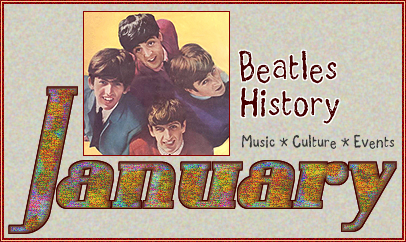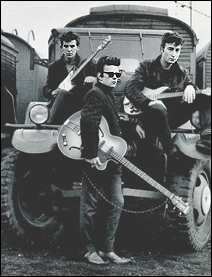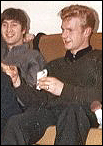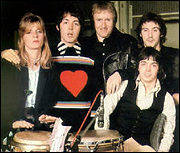 History offers History offers
a chance
to truly
understand
how the past
impacts the now.
Follow our
daily timelime
of historical
events to
discover the
role The Beatles
played in changing
the modern world.
THE FOLLOWING EVENTS TOOK PLACE SOMETIME IN JANUARY
 1960--Stuart Sutcliffe joins The Quarry Men, using part of the money he received from the sale of a painting to make a down payment on the purchase of a bass guitar. Stuart's mother Millie made the remaining payments. [Note: many sources state that Sutcliffe purchased the bass guitar outright, using all of the proceeds from the sale of one of his paintings to millionaire John Moore, but Bill Harry cites letters that Stuart wrote to his mother from Hamburg, asking her to keep up the payments on the guitar, as proof that the generally-recognized version is wrong.] It is widely believed that Sutcliffe's parents had wanted him to put all of the John Moore money back into his artistic career and that John Lennon persuaded him to buy the bass guitar instead. However, according to Bill Harry, Millie Sutcliffe was, for the most part, supportive of Stuart's musical endeavors. Another standard, but incorrect, story is that Sutcliffe never really learned to play his bass guitar and often turned his back to the audience during performances to hide his lack of ability. Bill Harry states that this is absolutely not true, blaming this misconception on erroneous statements made by Allan Williams, particularly in his book "The Man Who Gave The Beatles Away." According to Harry, "Stuart did not play with his back to the audience. I saw Stuart play long before Williams did, because they used to play at our art college dances. I have checked every photograph of Stuart playing that I can find and on every one he is facing the audience. He wasn't the best player in the world, but he could play his instrument. He taught Klaus Voorman how to play bass guitar." Most sources also report that Sutcliffe suggested the name "Beatals." However, Bill Harry states that Stuart came up with the name "Beetles" (due to its similarity to the name of Buddy Holly's group, The Crickets). The name "Silver Beetles" was adopted first, and when it was shortened to "Beatles," it was John Lennon who substituted the "a". 1960--Stuart Sutcliffe joins The Quarry Men, using part of the money he received from the sale of a painting to make a down payment on the purchase of a bass guitar. Stuart's mother Millie made the remaining payments. [Note: many sources state that Sutcliffe purchased the bass guitar outright, using all of the proceeds from the sale of one of his paintings to millionaire John Moore, but Bill Harry cites letters that Stuart wrote to his mother from Hamburg, asking her to keep up the payments on the guitar, as proof that the generally-recognized version is wrong.] It is widely believed that Sutcliffe's parents had wanted him to put all of the John Moore money back into his artistic career and that John Lennon persuaded him to buy the bass guitar instead. However, according to Bill Harry, Millie Sutcliffe was, for the most part, supportive of Stuart's musical endeavors. Another standard, but incorrect, story is that Sutcliffe never really learned to play his bass guitar and often turned his back to the audience during performances to hide his lack of ability. Bill Harry states that this is absolutely not true, blaming this misconception on erroneous statements made by Allan Williams, particularly in his book "The Man Who Gave The Beatles Away." According to Harry, "Stuart did not play with his back to the audience. I saw Stuart play long before Williams did, because they used to play at our art college dances. I have checked every photograph of Stuart playing that I can find and on every one he is facing the audience. He wasn't the best player in the world, but he could play his instrument. He taught Klaus Voorman how to play bass guitar." Most sources also report that Sutcliffe suggested the name "Beatals." However, Bill Harry states that Stuart came up with the name "Beetles" (due to its similarity to the name of Buddy Holly's group, The Crickets). The name "Silver Beetles" was adopted first, and when it was shortened to "Beatles," it was John Lennon who substituted the "a".
 1968--Pete Shotton is replaced as manager of the Apple Boutique by John Lyndon. Shotton becomes John Lennon's personal assistant. 1968--Pete Shotton is replaced as manager of the Apple Boutique by John Lyndon. Shotton becomes John Lennon's personal assistant.
 1975--Geoff Britton leaves Paul McCartney's group, Wings. 1975--Geoff Britton leaves Paul McCartney's group, Wings.
1978--UK re-release of The Beatles' LP Sgt. Pepper's Lonely Hearts Club Band on picture disc (Parlophone).
1979--UK re-release of The Beatles' double LP The Beatles (the White Album) on white vinyl (Parlophone).
1979--UK re-release of The Beatles' LP Abbey Road on green vinyl (Parlophone).
1979--UK re-release of The Beatles' LP Let It Be on white vinyl (Parlophone).
1984--US re-release of The Beatles' December 1963 single, I Want to Hold Your Hand / I Saw Her Standing There (Capitol). There is a slightly altered picture sleeve.
1985--John Lennon (posthumously) and Paul McCartney are commended by the National Coalition on Television Violence for their "pro-social" music videos.
1986--US re-release of the John Lennon / Yoko Ono LP, Unfinished Music #1: Two Virgins (Apple / Tetragrammaton). It is issued by Out of the Past Records, which had bought the Tetragrammaton catalog. This reissue is virtually indistinguishable from the original release.
1987--UK re-release of the John Lennon / Yoko Ono / Plastic Ono Band (with Elephant's Memory) double LP, Some Time in New York City on double CD (Parlophone). Due to poor sound quality, it is quickly withdrawn and reissued on August 10, 1987.
For more day-by-day history go to HistoryUnlimited.net
|
 History offers
History offers


